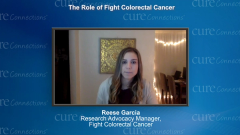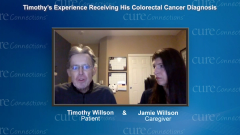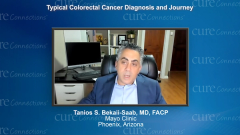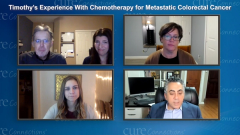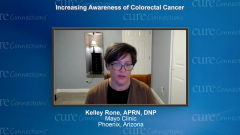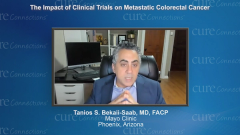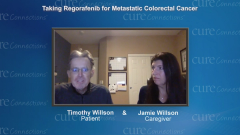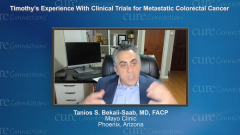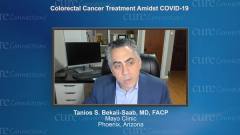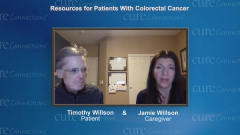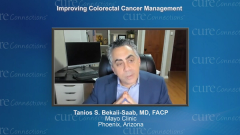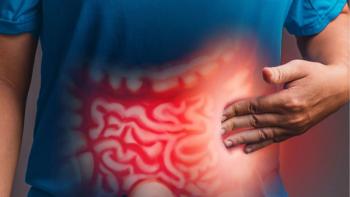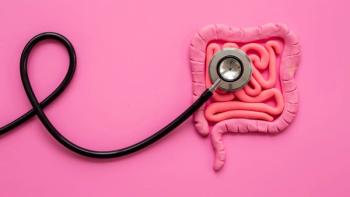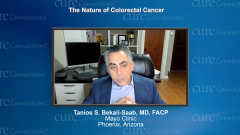
Timothy’s Experience Receiving His Colorectal Cancer Diagnosis
Episodes in this series

Tanios S. Bekaii-Saab, MD, FACP: Tim, you are the focus of why we are here: you and Jamie, but mostly you. Share a bit about your diagnosis. What signs and symptoms led you to seek medical attention? This snuck up on you because it came just short of when you were supposed to get your colonoscopy as recommended. You did not know that this was there, but I wonder if, retrospectively, there were any signs and symptoms you can think of that perhaps others need to be looking for. How did you end up under medical care, and what tests were initially performed?
Timothy Willson: My diagnosis was a little different to say the least. I was on my way to the airport to go to play in a hockey tournament in Florida, and I had had a pain in the middle of my stomach for the last month, but it was not bad. I tried taking some antacids, proton pump inhibitors, and that helped a bit, but it got increasingly worse—the pain and tightness. I did not know if it was a muscle or if there was something else going on, so I was worried about that. I turned the car around, and I went to the ER [emergency room]. It turned out that I had appendicitis, and they took my appendix out the next day. I went home—and this was maybe two days later—but something was still not right there. They did a CT scan, and I had a blockage. Then they did a biopsy and found out what it was, but that was pretty much it. I was relieved for a day and a half because I thought, “It was just appendicitis.” In the back of my mind, I was thinking it could be something worse.
That is how I had a downstream issue with the appendix. They took it out, then they went back and did a biopsy. They came in the following day and said that it was cancer. It was shocking to me, to say the least, because I was young, and they were telling me that. The gastroenterologist at that time said, “It does not look like cancer, but we are going to do a biopsy.” They came the next day and gave me the news on that. It is something you do not forget. I can still hear the surgeon’s voice today saying, “You have cancer.” That is how it turned out. On the one hand, I was lucky that it did not linger longer and that the appendicitis brought me into the hospital. It was a little different.
Tanios S. Bekaii-Saab, MD, FACP: Were you having any symptoms before then? Anything that you can think about?
Timothy Willson: It was a tightness in the middle of my stomach, and it got worse after I ate, but no other real symptoms. I had no family history, and it was just something that I was aware of. But that was the only symptom I had. I did not have any bleeding.
Tanios S. Bekaii-Saab, MD, FACP: For folks who are listening, you were quite active and athletic.
Timothy Willson: Yeah, I exercised three or four times a week, vigorous exercise: running, weights, the whole thing. It just snuck up on me, and I was fortunate that it was stage III when they initially caught it. For symptoms, I did not have a lot of them. As Kelley said, I was relatively young, and they were downplaying it. I was asking what else could it be, and they said, “You look healthy. You do not have any really big symptoms other than the pain in your stomach.”
Tanios S. Bekaii-Saab, MD, FACP: Jamie, you were there when they came in and said, “You have cancer.” What goes through your mind?
Jamie Willson: Shock, disbelief. As Tim mentioned, it was so unusual in terms of coming in for an appendectomy and then the next day finding out it was cancer, and to wrap your head around that because, as he mentioned, he was so active. Not only did he work out quite a bit, but he was still playing adult hockey. He was incredibly active and young for his age. It was difficult to understand what was going on, how this happened, and how we got there. It was all a lot to take in at that point in time with it being so new.
Tanios S. Bekaii-Saab, MD, FACP: Have you had anyone with cancer in the family? Have you dealt with cancer before that in the family?
Jamie Willson: Unfortunately, I have dealt with quite a bit. I had a sister who passed away at 32 from malignant melanoma, and my father passed away a couple of years later from lung cancer. For me, that was the other thing: Cancer meant something terrible in my experience. When I found out, it was devastating because everybody in my life who had cancer did not do well in a very short period of time.
Tanios S. Bekaii-Saab, MD, FACP: Going back to you, Tim, when you were initially diagnosed, your cancer was in an earlier stage. It was not the earliest, but it was an earlier stage. It was stage III.
Timothy Willson: Stage III.
Tanios S. Bekaii-Saab, MD, FACP: You had your surgery then, so tell us about that. You then had some chemotherapy.
Timothy Willson: Yes, I probably had the standard of care. They took out about 11 inches of my colon, 29 lymph nodes, and everything looked OK from that perspective. From there, I waited about a month, and we then started FOLFOX-6 [5-fluorouracil, leucovorin calcium, oxaliplatin]. That runs about six months. I did fine after that for a good 18 months, and then I moved to the Mayo Clinic for my care. Everything was good for another couple of months. Then on a routine six-month CT scan, they noticed a little growth or something in the mesenteric area of my stomach. I started on cetuximab and 5-FU [5-fluorouracil]–leucovorin for six treatments, and that lasted for quite a while. That was a good year, year and a half; before that, it was more proactive.
I would not say I started to relapse, but there was still some cancer in there, and that is when they decided to do some radiation on it. I went through six courses of radiation at a lower dose, and that sufficed me for another six to eight months. I had surgery after that. I had a scar from the whole front of me, and they looked at taking it out, but it was too risky. The damage to the arteries that feed the small intestine was just too dangerous, so they did not hurt me, which was good. They put some clips around the lesions, the tumors, and I then had another course of radiation. They bumped up the radiation because they could see it better with the clips on.
Transcript Edited for Clarity

